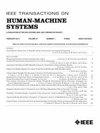Cognitive Load-Based Affective Workload Allocation for Multihuman Multirobot Teams
IF 4.4
3区 计算机科学
Q2 COMPUTER SCIENCE, ARTIFICIAL INTELLIGENCE
引用次数: 0
Abstract
The interaction and collaboration between humans and multiple robots represent a novel field of research known as human multirobot systems. Adequately designed systems within this field allow teams composed of both humans and robots to work together effectively on tasks, such as monitoring, exploration, and search and rescue operations. This article presents a deep reinforcement learning-based affective workload allocation controller specifically for multihuman multirobot teams. The proposed controller can dynamically reallocate workloads based on the performance of the operators during collaborative missions with multirobot systems. The operators' performances are evaluated through the scores of a self-reported questionnaire (i.e., subjective measurement) and the results of a deep learning-based cognitive workload prediction algorithm that uses physiological and behavioral data (i.e., objective measurement). To evaluate the effectiveness of the proposed controller, we conduct an exploratory user experiment with various allocation strategies. The user experiment uses a multihuman multirobot CCTV monitoring task as an example and carry out comprehensive real-world experiments with 32 human subjects for both quantitative measurement and qualitative analysis. Our results demonstrate the performance and effectiveness of the proposed controller and highlight the importance of incorporating both subjective and objective measurements of the operators' cognitive workload as well as seeking consent for workload transitions, to enhance the performance of multihuman multirobot teams.基于认知负荷的多人多机器人团队情感工作量分配
人与多机器人之间的相互作用和协作代表了一个新的研究领域,即人多机器人系统。在这一领域中,充分设计的系统允许由人类和机器人组成的团队有效地共同完成任务,如监测、探索、搜索和救援行动。针对多人多机器人团队,提出了一种基于深度强化学习的情感工作量分配控制器。在多机器人协同任务中,该控制器可以根据操作者的表现动态地重新分配工作负载。通过自我报告的问卷得分(即主观测量)和基于深度学习的认知工作量预测算法的结果(即客观测量)来评估操作员的绩效。为了评估所提出的控制器的有效性,我们使用各种分配策略进行探索性用户实验。用户实验以多人多机器人CCTV监控任务为例,对32名人体受试者进行了全面的真实世界实验,进行了定量测量和定性分析。我们的研究结果证明了所提出的控制器的性能和有效性,并强调了结合操作员认知工作量的主观和客观测量以及寻求工作量转换同意的重要性,以提高多人多机器人团队的绩效。
本文章由计算机程序翻译,如有差异,请以英文原文为准。
求助全文
约1分钟内获得全文
求助全文
来源期刊

IEEE Transactions on Human-Machine Systems
COMPUTER SCIENCE, ARTIFICIAL INTELLIGENCE-COMPUTER SCIENCE, CYBERNETICS
CiteScore
7.10
自引率
11.10%
发文量
136
期刊介绍:
The scope of the IEEE Transactions on Human-Machine Systems includes the fields of human machine systems. It covers human systems and human organizational interactions including cognitive ergonomics, system test and evaluation, and human information processing concerns in systems and organizations.
 求助内容:
求助内容: 应助结果提醒方式:
应助结果提醒方式:


